Canada does not accept the results of the Aug. 9 “fraudulent” presidential election in Belarus and calls for “free and fair elections,” Foreign Affairs Minister Francois-Philippe Champagne said Monday as tens of thousands of Belarusians marched to demand the resignation of President Alexander Lukashenko.
A sea of peaceful protesters flooded the streets of Belarusian capital Minsk on Monday for the ninth straight day of protests, despite an earlier brutal crackdown by police and security forces that saw thousands of people detained and police using rubber bullets, tear gas and concussion grenades to disperse crowds.
“Canada joins its partners in the international community in condemnation of the crackdown on peaceful protesters following the presidential election in Belarus,” Champagne said.
“We do not accept the results of this fraudulent presidential election in Belarus and call for free and fair elections.”
Champagne said Canada is also calling for a thorough investigation of events surrounding the disputed election and the police crackdown to be conducted through the Organization for Security and Co-operation in Europe.
‘Go away!’
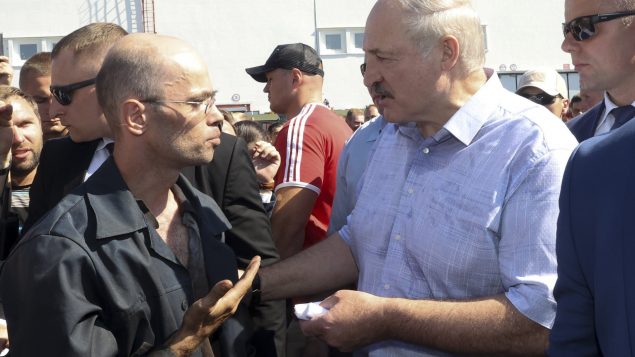
Belarusian President Alexander Lukashenko, second right, argues with a worker of the Minsk Wheel Tractor Plant in Minsk, Belarus, Monday, Aug. 17, 2020. Lukashenko visited Wheel Tractor Plant on Monday and dismissed the strikes as insignificant. “So, 150 (people) at some factory, even 200 don’t make a difference,” the president was quoted as saying by the state Belta news agency. (Nikolai Petrov/BelTA Pool Photo via AP)
Lukashenko, a former collective farm manager who has ruled the Eastern European country with an iron fist for 26 years, was jeered by factory workers in the capital Minsk as he visited a factory and strikes grew across Belarus.
Angry workers at the Minsk Wheeled Tractor Plant, who were once considered the core of Lukashenko’s electorate, chanted “Liar” and “Go away!” raising the pressure on the authoritarian leader to step down.
“Thousands of people across Belarus are in the streets calling for an end to police brutality, the release of political prisoners and credible elections,” Champagne said.
‘Canada will continue to stand with the people of Belarus’
On Saturday, Champagne spoke with opposition presidential candidate Svetlana Tikhanovskaya who fled to neighbouring Lithuania on Aug. 11, conceding in a video posted online that she was unprepared for the kind of brutal pressure and intimidation that the Lukashenko regime exerted at her.
The official results of the election gave Lukashenko 80 per cent of the votes and Tikhanovskaya only 10 per cent, but the opposition claimed the outcome was falsified. The 37-year-old former teacher has cited reports from precincts around the country showed her winning 60 to 70 per cent of the vote.
Her husband, an opposition blogger, has been jailed since May, and she had replaced him on the ballot.
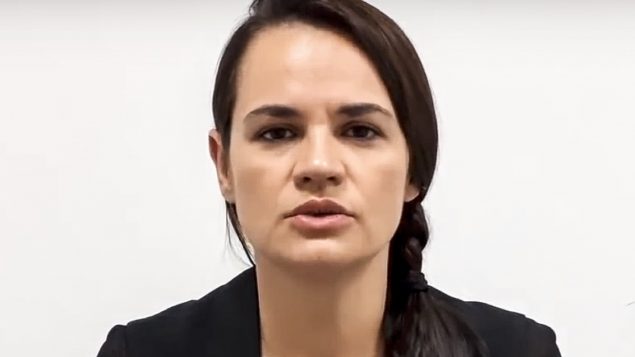
In this video grab provided by the Sviatlana Tsikhanouskaya campaign office via the Associated Press Television, Svetlana Tikhanovskaya, former candidate for the presidential elections addresses the Belarus nation from Vilnius, Lithuania, Sunday, Aug. 16, 2020. Belarus’ opposition presidential candidate Svetlana Tikhanovskaya has announced she is ready to take on the mantle of the presidency after a week of daily mass protests across the country. (Svetlana Tikhanovskaya campaign office vis AP)
“As I stated to opposition candidate Svetlana Tikhanovskaya during our call on Saturday, Canada will continue to stand with the people of Belarus, and we will work with our international partners to ensure that their voices are heard and that those responsible for undermining democracy and for brutal actions against protestors are held to account,” Champagne said.
In a video statement on Monday, Tikhanovskaya said she was prepared to step in.
“I’m ready to take on the responsibility and act as a national leader in order for the country to calm down, return to its normal rhythm, in order for us to free all the political prisoners and prepare legislation and conditions for organizing new presidential elections,” she said.
Turning to Moscow for help?
Many in Belarus fear that desperate to hold on to power Lukashenko will turn to Moscow for support in suppressing the protests.
Lukashenko spoke twice by telephone with Russian President Vladimir Putin over the weekend.
Russia and Belarus have close cultural, economic, military and political ties. Shortly after the collapse of the Soviet Union, the two former Soviet republics began a process of economic and political integration that culminated in the signing of the Treaty on the Creation of a Union State of Russia and Belarus in December of 1999.
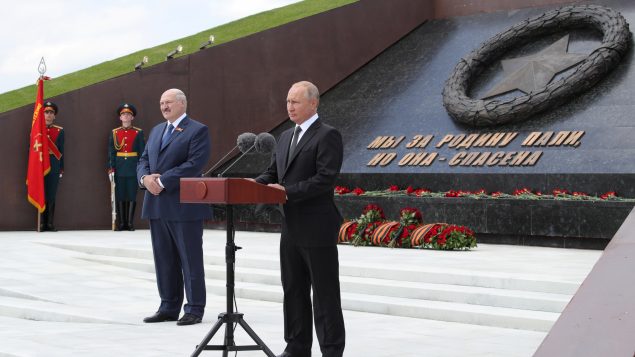
Russian President Vladimir Putin and his Belarusian counterpart Alexander Lukashenko attend a ceremony unveiling a Second World War memorial to the Soviet Soldier near Rzhev in Tver Region, Russia June 30, 2020. (Mikhail Klimentyev/Sputnik/Kremlin via REUTERS)
However, both Belarus and Russia for different reasons have resisted the full implementation of the treaty, which calls for a common head of state, legislature, flag, coat of arms, anthem, constitution, army, citizenship and currency, while allowing both countries to retain full sovereignty in internal and international affairs.
According to Lukashenko, Putin assured him Moscow stands ready to provide support in the face of what he described as foreign aggression. He claimed that NATO nations are beefing up military forces on the border with Belarus — a claim the alliance rejected.
It’s a full turnaround for Lukashenko, who only three weeks earlier, had claimed Russia had dispatched mercenaries to Belarus to cause trouble following the election.
And many Russia watchers say, while Putin might be willing to extract further concessions from Belarus on the union, he is not in a hurry to invade Belarus to prop up Lukashenko.
“The Kremlin has had enough of Lukashenko, but it cannot allow Belarus to follow the path of Ukraine and become another anti-Russian, NATO-leaning bulwark on its borders,” writes Dmitri Trenin, a Russian military and foreing policy expert at Carnegie Endowment in Moscow, in an analysis piece.
Nor can Moscow allow a rebellion leading to a bloodbath, Trenin writes.
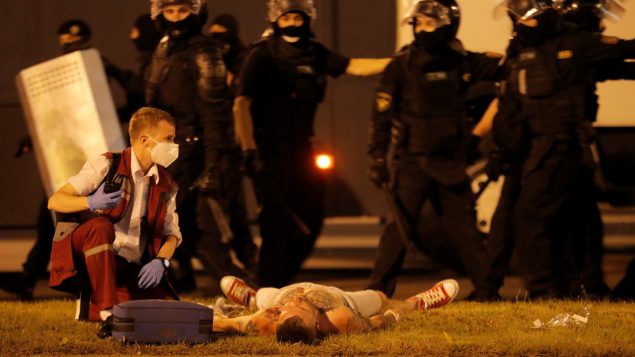
An injured protester Yevgeny Zaichkin lies on the ground while receiving assistance during clashes with law enforcement officers after presidential election polls closed in Minsk, Belarus, Aug. 9, 2020. Zaichkin who was reported to have died during bloody clashes with police after the presidential election told Reuters he had survived a brutal police beating and that he expected to be detained shortly. (Vasily Fedosenko/REUTERS)
Trenin says the Kremlin faces four tough choices in Belarus.
“First, a Russian military intervention in Belarus to stabilize its ally: this should be avoided at all costs because of the inevitable disastrous consequences,” Trenin writes.
The second option is to do nothing and allow Lukashenko to fall, hoping that whoever comes after him will take account of Belarus’ close ties with Russia, Trenin writes, dismissing it as “too risky.”
An upheaval may turn into a bloodbath, forcing Moscow to exercise the first option, he adds.
The third option is to capitalize on Lukashenko’s shattered relations with the West and envelop him in a tight embrace, Trenin writes. But that would be counterproductive, he argues.
“It would make Russia an accomplice to the doomed regime, and breed hatred for Russia using Moscow’s own money,” Trenin writes. “The fourth option is to look beyond Lukashenko and manage a transfer of power in Minsk.”
With files from The Associated Press
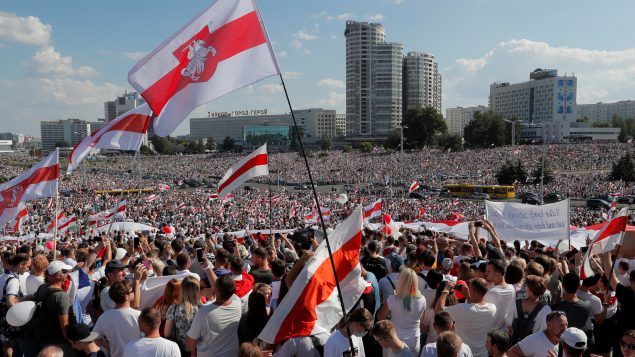






For reasons beyond our control, and for an undetermined period of time, our comment section is now closed. However, our social networks remain open to your contributions.